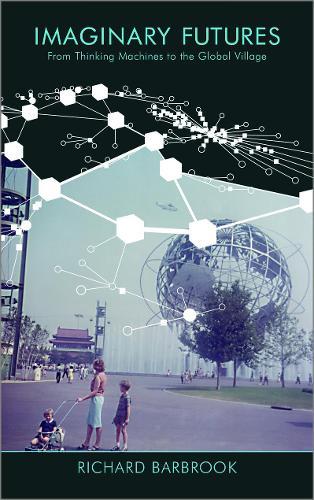Awards
- Winner of Marshall McLuhan Award for Outstanding Book in the Field of Media Ecology 2008
- Winner of Marshall McLuhan Award for Outstanding Book in the Field of Media Ecology 2008.
Overview
This book is a history of the future. It shows how our contemporary understanding of the Internet is shaped by visions of the future that were put together in the 1950s and 1960s. At the height of the Cold War, the Americans invented the only working model of communism in human history: the Internet. Yet, for all of its libertarian potential, the goal of this hi-tech project was geopolitical dominance: the ownership of time was control over the destiny of humanity. The potentially subversive theory of cybernetics was transformed into the military-friendly project of 'artificial intelligence'. Capitalist growth became the fastest route to the 'information society'. The rest of the world was expected to follow America's path into the networked future. Today, we're still being told that the Internet is creating the information society - and that America today is everywhere else tomorrow. Thankfully, at the beginning of the twenty-first century, the DIY ethic of the Internet shows that people can resist these authoritarian prophecies by shaping information technologies in their own interest. Ultimately, if we don't want the future to be what it used to be, we must invent our own, improved and truly revolutionary future.
Full Product Details
Author: Richard Barbrook
Publisher: Pluto Press
Imprint: Pluto Press
Dimensions:
Width: 13.50cm
, Height: 2.80cm
, Length: 21.50cm
Weight: 0.620kg
ISBN: 9780745326610
ISBN 10: 0745326617
Pages: 336
Publication Date: 20 April 2007
Audience:
Professional and scholarly
,
Professional and scholarly
,
Professional & Vocational
,
Postgraduate, Research & Scholarly
Format: Hardback
Publisher's Status: Active
Availability: In Print

This item will be ordered in for you from one of our suppliers. Upon receipt, we will promptly dispatch it out to you. For in store availability, please contact us.
Reviews
'A compelling, authoritative, and painstakingly documented narrative, Imaginary Futures traces the emergence of the computer era in the context of desperately competing ideologies, economics, and empires. This is a work of passionate and persuasive scholarship by a contemporary social theorist at the top of his game' -- Douglas Rushkoff, author, Coercion, Media Virus, Get Back in the Box. 'Barbrook has an amusing take on our distorted - if not delusional - relationship with technology, but his underlying point is serious: future visions of technology are used to distract us and also control us, and if we forget these imaginary futures, we are likely to repeat them' -- Guardian Unlimited
'Imaginary Futures: from thinking machines to the global village' by Richard Barbrook has won the the 2008 Marshall McLuhan Award for Outstanding Book in the Field of Media Ecology. -- Marshall McLuhan Award for Outstanding Book in the Field of Media Ecology Barbrook has an amusing take on our distorted - if not delusional - relationship with technology, but his underlying point is serious: future visions of technology are used to distract us and also control us, and if we forget these imaginary futures, we are likely to repeat them. -- Guardian Unlimited Barbrook has an amusing take on our distorted - if not delusional - relationship with technology, but his underlying point is serious: future visions of technology are used to distract us and also control us, and if we forget these imaginary futures, we are likely to repeat them. -- Guardian Unlimited A compelling, authoritative, and painstakingly documented narrative, Imaginary Futures traces the emergence of the computer era in the context of desperately competing ideologies, economics, and empires. This is a work of passionate and persuasive scholarship by a contemporary social theorist at the top of his game. -- Douglas Rushkoff, author, Coercion, Media Virus, Get Back in the Box. A compelling, authoritative, and painstakingly documented narrative, Imaginary Futures traces the emergence of the computer era in the context of desperately competing ideologies, economics, and empires. This is a work of passionate and persuasive scholarship by a contemporary social theorist at the top of his game. -- Douglas Rushkoff, author, Coercion, Media Virus, Get Back in the Box. Imaginary Futures gives insight into how the dominant utopias of today were shaped in the time of the Cold War and served the ideological needs of the elites. While the Cold War West had a much better present, it was the Soviet East which had a vision of the future. The invention of a Western utopia became an important factor in the struggle for global power. -- Boris Kagarlitsky, Senior Research Fellow in the Institute for Comparative Political Studies, the Russian Academy of Sciences Imaginary Futures gives insight into how the dominant utopias of today were shaped in the time of the Cold War and served the ideological needs of the elites. While the Cold War West had a much better present, it was the Soviet East which had a vision of the future. The invention of a Western utopia became an important factor in the struggle for global power. -- Boris Kagarlitsky, Senior Research Fellow in the Institute for Comparative Political Studies, the Russian Academy of Sciences
Author Information
Richard Barbrook is a senior lecturer in the Faculty of Social Sciences and Humanities at the University of Westminster. He is the author of Media Freedom (Pluto, 1995) and Imaginary Futures (Pluto, 2007).



